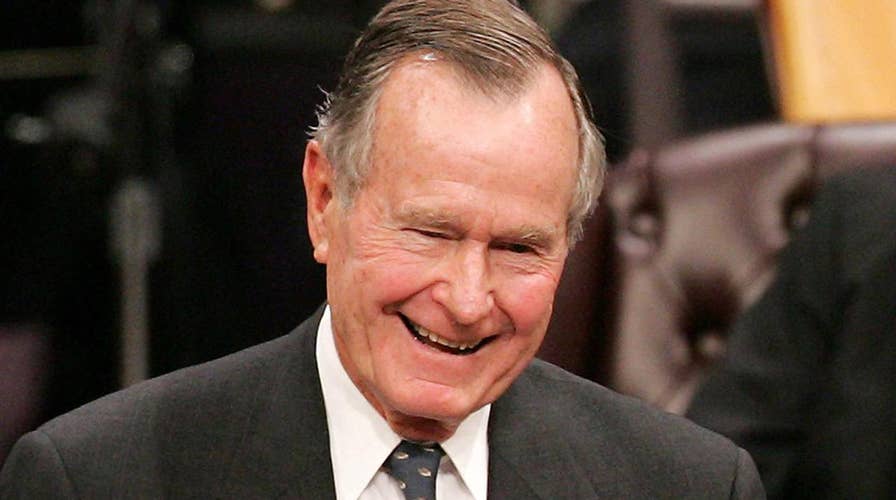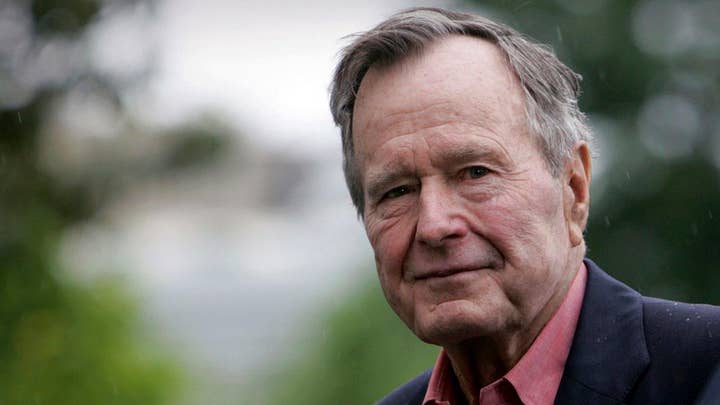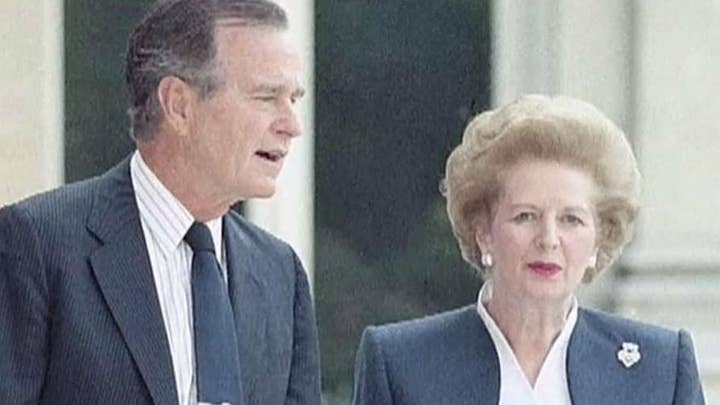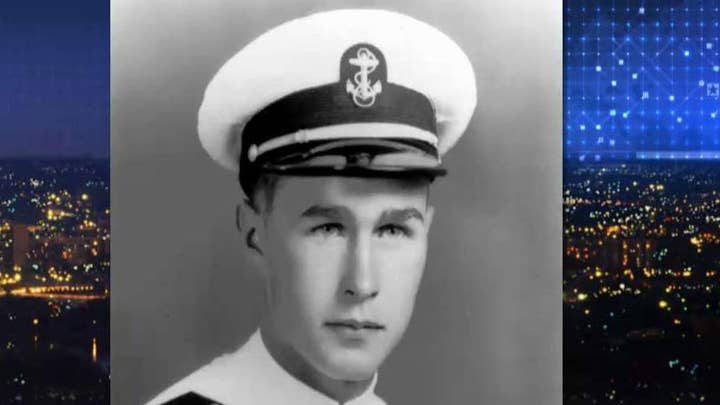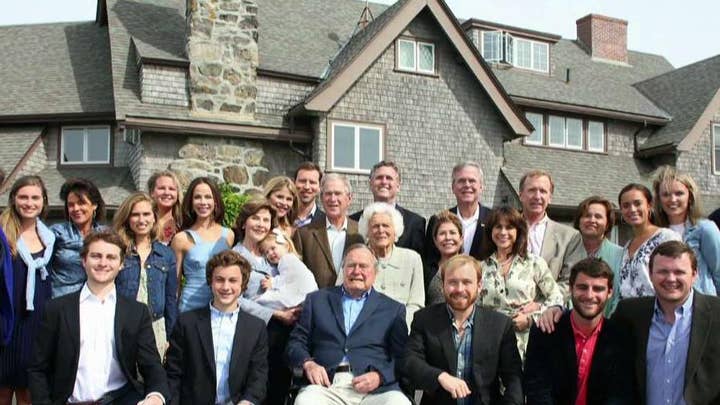The life and times of George H.W. Bush
George Herbert Walker Bush took office in 1989 as the 41st U.S. president and served one term in the White House. The father of former President George W. Bush, he was a Naval aviator in World War II, a congressman, ambassador to the United Nations, envoy to China, CIA director and vice president for two terms under Ronald Reagan.
Service to his country was central to the life of George Herbert Walker Bush, who died Friday at age 94.
Born into wealth and privilege as the son of a banker who later became a U.S. senator, Bush nevertheless postponed his career by enlisting in the U.S. Navy soon after the Japanese attacked Pearl Harbor in 1941.
Bush too made his mark on U.S. politics, becoming a U.S. congressman when he was 42 years old. He led the Republican Party, represented the U.S. overseas and directed the CIA -- all before he became 41st president of the U.S. His son, George W. Bush, would follow in his footsteps and become the 43rd president.
Read on for a look at the elder Bush’s storied political career.
President; 1989-1993
Bush was sworn in as the 41st president in January 1989, defeating then-Massachusetts Gov. Michael Dukakis, a Democrat.
During his presidency, Bush oversaw the U.S. during the fall of the Berlin wall, the Tiananmen Square Massacre in Beijing and the start of the Persian Gulf War, according to a timeline from the University of Virginia’s Miller Center of Public Affairs. He also sent troops into Panama to assist with the overthrow of dictator Manuel Noriega and sent support to Kuwait when Iraqi President Saddam Hussein invaded the Middle Eastern nation in what became the Gulf War.
“Throughout his presidency, George Bush worked closely with his international counterparts, including Soviet leader Mikhail Gorbachev, in ways that advanced America’s interests in peace and economic opportunity,” his presidential library biography says.
Legislatively, Bush banned foreign-made semi-automatic rifles in 1989. He nominated Clarence Thomas to the Supreme Court in 1991.
Bush also signed the Immigration Act of 1990, “the most comprehensive reform of our immigration laws in 66 years,” he said. The law increased the number of immigrants allowed to enter the U.S. every year. It also established the diversity visa program, which allows people from countries with low immigration rates to the U.S. to come into the country, and provides family-based visas.
Bush served only one term in office, losing re-election in 1992 to Bill Clinton.
Vice president; 1981-1989
Bush was selected as Reagan’s running mate after he unsuccessfully campaigned for the Republican presidential nomination himself.
As vice president, Bush worked with anti-drug programs as well as federal deregulations, according to a White House biography. During this time, he also visited several foreign nations.
According to his library biography, Bush was the first sitting vice president to take over the White House since 1837.
CIA director; 1976-1977
Bush headed the CIA for only a year, but during his tenure he “is credited with restoring focus and boosting morale, and he remains one of the most beloved directors in the Agency’s history,” the agency described in a post online.
“I think we should think of the CIA as a national asset that must be preserved as a vital part of our defense system,” Bush said in 1978, after he left the agency. “It is important that the American people understand the intricate job the CIA is doing in an increasingly complex world. It is essential we have the support of the American people.”
Bush worked to repair the relationship between the CIA and Congress -- and in doing so, he ended up testifying 51 times before Congress in his year at the agency, the CIA said.
He also gave Jimmy Carter CIA briefings when he was just a presidential nominee. Those briefings helped Carter in debates on foreign policy with then-President Gerald Ford during the campaign, the CIA said. Despite Carter’s gratefulness to Bush for his briefings, Bush offered his resignation when Carter won the presidency, and he accepted.
Head of U.S. Liaison Office to the People’s Republic of China; 1974-1975
Bush was appointed head of the U.S. Liaison Office to the People’s Republic of China by then-President Gerald Ford in 1974.
The crucial appointment meant Bush served as the U.S. envoy to the nation, as the U.S. did not have full diplomatic relations with China at the time, according to the Miller Center.
During his time in China, Bush and his wife, Barbara, would bicycle around Beijing to learn “ordinary Chinese,” the Washington Post reported. He also met with government officials and attended embassy receptions.
Bush was offered ambassadorships to other places -- London and Paris, specifically, according to the Washington Post -- but he turned them down as he believed China would become a major world player, according to the newspaper.
RNC chair; 1973-1974
Bush led the Republican National Committee at the request of then-President Richard Nixon. And during the Watergate scandal, Bush initially remained a stalwart defender of president.
After the tapes were released, Bush told Nixon he no longer had the support of the party, according to the Miller Center. Nixon would resign in 1974.
On the day of the resignation, Bush reportedly wrote in his diary there was “an aura of sadness, like somebody died,” adding Nixon’s speech left “everyone in the room in tears.”
UN ambassador; 1971-1973
Bush was confirmed U.S. ambassador to the United Nations in 1971 despite critics who worried about his lack of foreign policy experience at the time. The appointment came after an unsuccessful Senate bid.
“His distinguished service in the House, his years of experience before that in activities in private enterprise, which took him abroad to many countries, and, most important his enormous interest in the United Nations, his support of the United Nations and its objectives, not only its peacekeeping objectives, but also its objectives in the field of the environment and all of the others that will be so exciting in the next decade -- these are the qualities that led us to the conclusion that he was the best man who could now go to this very important post,” Nixon said when he nominated Bush.
The Miller Center said Bush was not part of the Nixon White House’s “inner circle,” which did not help his tenure at the UN.
Texas congressman; 1967-1971
Bush served two terms in the U.S. House of Representative, running in the Houston-area district as a moderate Republican, according to the Miller Center.
During his time in Congress, Bush served on the House Ways and Means Committee -- a rarity for a freshman congressman. Going against some of the more conservative voters in his district, Bush voted for the Fair Housing Act in 1968. He also supported the Vietnam War, according to the Miller Center.
He left the House to launch an unsuccessful Senate bid, losing to a conservative Democrat.
Post-White House life
When Bush left the White House, his political activism wasn’t over.
He supported U.S. Sen. John McCain of Arizona for the Republican presidential nominee in 2008, at a time when McCain was trying to woo the more conservative members of his party.
In Mark K. Undegrove’s book “The Last Republicans,” published in Nov. 2017, Bush revealed that he didn’t vote for Republican presidential nominee Donald Trump; instead, he voted for Democrat Hillary Clinton. In the book, Bush also called President Trump a “blowhard.”
In 2011, then-President Barack Obama awarded Bush the Presidential Medal of Freedom.
“We honor George Herbert Walker Bush for service to America that spanned nearly 70 years, from a decorated navy pilot who nearly gave his life in World War II, to U.S. ambassador to the United Nations, from CIA director to U.S. envoy to China, to the vice presidency. His life is a testament that public service is a noble calling,” Obama said.
Later, Bush would team up with four other living former presidents -- Carter, Clinton, Obama and his son, George W. -- for hurricane relief efforts after three major storms hit parts of Texas, Puerto Rico and the U.S Virgin Islands, among other places. The fundraising effort was dubbed “One America Appeal.”
The elder Bush and Clinton also spearheaded a massive fund after Hurricane Katrina devastated Louisiana in 2005.




















